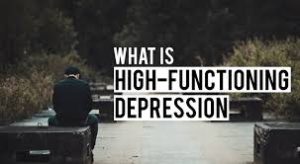Contents
- 1 What Is High Functioning Depression?
- 2 Symptoms Of High Functioning Depression
- 3 Causes Of Depression
- 4 Risk Factors Of High Functioning Depression
- 5 Coping With High Functioning Depression
- 6 Effects Of High Functioning Depression
- 7 Diagnosis Of High Functioning Depression
- 8 Prevention Tips For High Functioning Depression
- 9 Therapies For High Functioning Depression
- 10 Medications For High Functioning Depression
- 11 Conclusion
- 12 A Word From Therapy Mantra
What Is High Functioning Depression?

High functioning depression is a form of depressive disorder that doesn’t impair a person’s cognitive and physical abilities. This type of depression can go undetected because it does not show in people’s behavior, speech, or body language. In order to diagnose high functioning depression, doctors will ask questions about how one feels, whether they have been sleeping well, their eating habits, and other aspects that can affect moods.
One of the most difficult things about high functioning depression is that it can be hard to detect. Many people with this type of depression often function well in their professional and personal lives. Some common signs that you may have high functioning depression include feeling overwhelmed or helpless, feeling a constant sense of guilt, feeling anxious and irritable often, having problems concentrating or making decisions, excessive stress, and always feeling tired.
Symptoms Of High Functioning Depression
It can be hard to diagnose high functioning depression sometimes because it can be so hard to detect. There are several symptoms that you may have high functioning depression if there are problems with your everyday life, such as sleeping patterns, eating habits, concentration levels, and personal relationships. Some common symptoms of high functioning depression include-
- Feeling sad all the time even when there is no reason to be
- Feeling guilty or worthless even when there is no reason to feel that way
- Difficulty falling and staying asleep
- Eating too much or not enough food
- Always feeling tired
- Never wanting to socialize with family and friends anymore
Causes Of Depression
Depression can be caused by many different things, including life changes, genetics, chemical imbalances, and medication side effects. Some of the most common causes of depression include:
1. Life changes – When something major happens in your life, such as the death of a loved one, a divorce, or a job loss, it can lead to depression.
2. Genetics – Depression can sometimes be passed down from generation to generation. If you have a family history of depression, you are more likely to experience it yourself.
3. Chemical imbalances – People with depression often have lower levels of serotonin or norepinephrine in their brains.
4. Medication side effects – Many medications can cause depression as a side effect. For instance, birth control pills and steroids may cause people to become depressed.
Risk Factors Of High Functioning Depression
There are a few risk factors that can increase your chances of developing high functioning depression.

Some of these risk factors include-
- Having a family history of depression
- Experiencing a traumatic event
- Having low self-esteem
- Abusing drugs or alcohol
If you have any of these risk factors, it is important to be aware of them and seek help if you start to experience symptoms of depression.
Coping With High Functioning Depression
There are many different ways to cope with this type of depression. Some helpful coping strategies include-
- Talking to a therapist – This can be a great way to talk about your feelings and get support from someone who understands what you are going through.
- Exercising regularly – Going for a walk, doing yoga, or anything else that gets you moving can help to get your mind off of your problems and get you into shape at the same time!
- Keeping busy – Try not to let yourself get too overwhelmed by one thing. If there is a task that you do not want to do, try breaking it down into smaller steps in order to make it seem more manageable. Also, setting short-term goals can help keep things in perspective and reduce stress levels.
- Eating healthy– This is important because if you are eating poorly this could lead to negative effects on your overall mental health.
- Learning relaxation techniques – This can be anything from deep breathing to meditation.
- Seeking support – If you feel like your depression is worsening or you are having suicidal thoughts, it is important to seek help immediately.
- Get enough sleep – Most people need around 8 hours of sleep per night.
- Spend time with friends and family – Social support is crucial for maintaining mental health.
- Take breaks throughout the day – It’s important to take some time for yourself, even if it’s just 10 minutes each day.
- Practice self-care – Taking care of yourself is essential for staying healthy and happy.
- Find something you enjoy – Hobbies are a great way to stay relaxed and engaged in your life.
- Avoid alcohol and drugs – Instead, try some relaxing activities that can help lift your moods, such as meditation, yoga, or tai chi.
Effects Of High Functioning Depression

Over time, high functioning depression can lead to long-term effects that affect both your mind and body. These effects include:
- Loss of energy – With this disorder, people often feel extremely fatigued all the time, leading them to lose interest in activities they once enjoyed.
- Sleep problems – Insomnia is very common with high functioning depression; other sleep problems also regularly occur
- Physical health concerns – Due to stress and unhealthy eating habits ( lack thereof), individuals with HFD are more likely to have heart disease, heart attacks, diabetes, and strokes.
- Relationship issues – Depression often leads to relationship problems because the individual suffering from it becomes withdrawn and irritable.
- Career difficulties – When an individual is suffering from depression they are less likely to be able to do their job well or perform up to standards
- Substance abuse – It’s common for people with high functioning depression to abuse substances such as alcohol in order to cope with their feelings. However, this can lead to addiction.
Serious Effects
- Suicide – There is a higher risk of suicide when an individual has high functioning depression due to the fact that they won’t seek help for mental health concerns because they’re seen as successful by society; additionally, their depression might not be noticed because it is internalized.
- Psychosis – Psychosis refers to the loss of connection with reality, resulting in hallucinations or delusions. Individuals with high functioning depression are more likely to experience psychosis due to increased stress levels
- Alcohol/substance abuse – Substance abuse is common among people who suffer from high functioning depression because they use it as a coping mechanism; however, substance abuse can lead to addiction and severe health problems
- Organ damage – People with untreated HFD are at risk of organ damage due to increased stress on the heart and changes in dietary habits
- Increased self-esteem issues – People diagnosed with HFD may develop negative beliefs about themselves that become out of control and affect their self-esteem for the worse.
- Increased risk of death – Due to the fact that high functioning depression is often not treated, it can lead to severe medical conditions; therefore an individual’s risk of dying prematurely increases
Diagnosis Of High Functioning Depression

Since HFD is characterized by people hiding their depression or ‘pulling themselves together in order to appear like they are doing well when in reality they aren’t, diagnosing this disorder can be difficult since many patients will go undiagnosed. To diagnose high functioning depression doctors look for symptoms in two main areas: psychological and physical. Psychological symptoms include things like sadness/depressed mood (most days), low energy levels, sleep problems, etc. Physical symptoms include things like problems with sleep, appetite change, and psychomotor agitation. A combination of psychological and physical symptoms is necessary in order to diagnose HFD.
People with high functioning depression can go undiagnosed for years because it doesn’t show in their behavior or speech. If you suspect that there is a problem with your moods, you should see a doctor who can help diagnose this type of depression. There are several treatment options available depending on the severity of your symptoms.
Prevention Tips For High Functioning Depression
High-functioning depression is very difficult to deal with because it can go undiagnosed for years. If you have high functioning depression, you should try to eat healthy foods regularly, get enough sleep every night, exercise every day, meet up with your friends or family members instead of staying inside alone all the time, and seek professional help if symptoms start getting worse over time. If you are struggling with high functioning depression, it is important to seek help.
You can also use certain natural remedies to boost your moods naturally without using medications. Some of these remedies include
- Using lavender essential oil in your bath water
- Changing your diet so that it consists of vitamin B12-rich foods
- Going outside in fresh air frequently
- Taking supplements that are rich in omega 3 fatty acids
If you are struggling with high functioning depression, make sure to talk to your doctor about it. They can help diagnose the condition and prescribe medication or other remedies that may be helpful for you to cope with symptoms naturally.
Therapies For High Functioning Depression

There are many different therapies for high functioning depression that can be helpful in improving moods. Some of the most common therapies include
- Psychotherapy– Psychotherapy for children and adolescents is to develop social and emotional skills
- Cognitive-behavioral therapy – This type of therapy can help you change your negative thought patterns into positive ones
- Family-based treatment – A popular treatment for children with depression, involving both parents to teach them how to manage symptoms together
- Integrative therapies- Such as yoga and massage utilize breathing, relaxation, and meditation to treat both depression and anxiety
- Individual therapy– That is helpful with changing negative thoughts into positive ones and lifestyle changes, which can include starting an exercise routine, eating healthy foods regularly, getting enough sleep every night, and meeting up with family or friends instead of staying inside alone all day.
- Interpersonal therapy– This can help you to communicate with others in healthy ways and resolve conflicts effectively by learning key communication skills.
- Support groups– This can be helpful in removing the stigma associated with depression to reduce isolation.
- Somatic therapies- It can help improve physical health and remove stress so that you can relax and sleep better.
The most important step in dealing with high-functioning depression is talking to your doctor about it. They can help diagnose the condition and recommend natural remedies or therapies that will boost moods without using medication.
Medications For High Functioning Depression

The medications used for treating high-functioning depression have other uses as well. For instance, some medications that are helpful for people who have major depressive disorder can also be helpful for those whose symptoms are mild. The exact medications used for high-functioning depression depend on the symptoms present in each person, but they are generally antidepressants or mood stabilizers.
Some medications that are helpful for people with high functioning depressions include
- Selective serotonin reuptake inhibitors (SSRIs) – these include fluoxetine( Prozac ), sertraline( Zoloft ), and paroxetine( Paxil ).
- Atypical antidepressants – drugs that affect serotonin levels can help, including Wellbutrin and Remeron.
- Monoamine oxidase inhibitors (MAOIs) such as selegiline (Emsam) and phenelzine sulfate (Nardil).
- Medication therapy- there are several types of medications that can be helpful in treating high functioning depression. These include
- Stimulants such as methylphenidate (Ritalin) and dextroamphetamine (Dexedrine)
- Antidepressants such as bupropion (Wellbutrin), citalopram (Celexa), escitalopram (Lexapro), fluoxetine (Prozac), paroxetine (Paxil), and sertraline (Zoloft)
If you suspect that there may be a problem with your moods, then make an appointment to see a doctor who can help diagnose this type of depression and find out what treatment options may help improve your symptoms.
Conclusion
No matter what the circumstance, it is important to be aware of your mental health. You can think of depression as a broken car engine. The machine will still function but not at its full potential which means you may experience decreased efficiency and output in other areas like work or relationships. If you’ve been diagnosed with high functioning depression, it’s time to get help! You should consider therapy if social support isn’t enough for you while also considering seeking professional medical treatment options such as medication for mild cases, psychotherapy for moderate cases, and hospitalization when necessary. Depression isn’t your fault so don’t feel ashamed about talking to someone about how you’re feeling. It’s better than isolating yourself from the world by dealing with this on your own.
A Word From Therapy Mantra
Your mental health — Your psychological, emotional, and social well-being — has an impact on every aspect of your life. Positive mental health essentially allows you to effectively deal with life’s everyday challenges.
At TherapyMantra, we have a team of therapists who provide affordable online therapy to assist you with issues such as depression, anxiety, stress, workplace Issues, addiction, relationship, OCD, LGBTQ, and PTSD. You can book a free therapy or download our free Android or iOS app.


